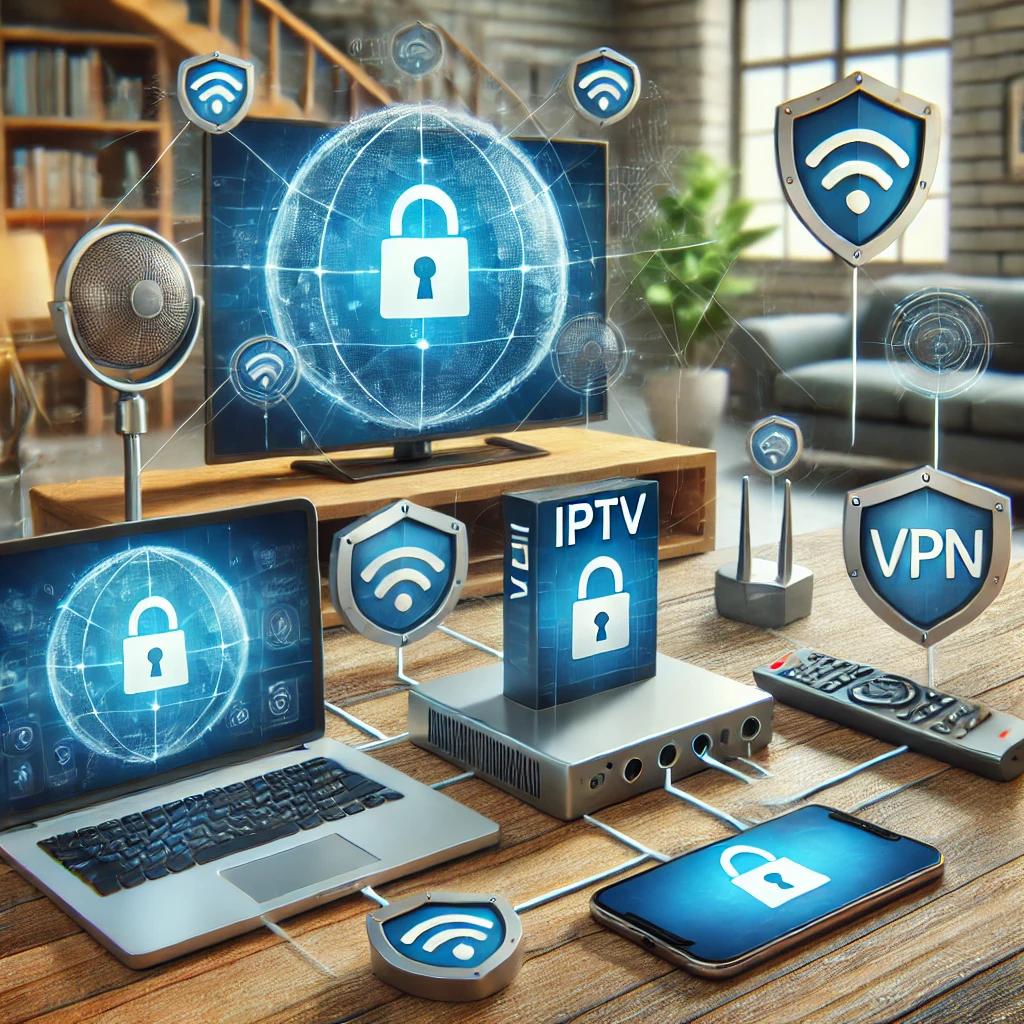
As IPTV (Internet Protocol Television) services grow in popularity, so do concerns about data privacy, security, and legal compliance. With the rise of IPTV, viewers can enjoy a vast array of content, including live TV, on-demand services, and international channels. However, while IPTV offers many benefits, users must take proactive steps to secure their devices and data. Without proper security measures, streaming through IPTV can expose users to risks such as data breaches, malware, identity theft, and legal issues.
This blog will offer essential security tips for safe IPTV usage, helping you protect your data, secure your device, and enjoy your IPTV services worry-free. We’ll also dive into the role of VPNs in securing your connection and recommend the best VPN services for IPTV.
1. Understand the Security Risks of IPTV
Before we get into the specific security tips, it’s important to understand the potential risks associated with IPTV usage. These risks stem from several factors:
- Unverified or Illegal IPTV Providers
Some IPTV services may offer access to content without proper licensing agreements. While these services may seem attractive because they offer low-cost or free access to premium content, they often bypass copyright laws. Using these services can put you at risk of legal repercussions. - Data Privacy Concerns
Without encryption, your data (including your IP address, browsing history, and personal details) can be visible to third parties, including your ISP (Internet Service Provider) or hackers. This data can be used for malicious purposes, such as identity theft or unauthorized access to your accounts. - Vulnerability to Malware and Phishing
IPTV apps from untrusted sources may contain malware or spyware designed to track your online activity or steal sensitive information. Additionally, IPTV-related phishing scams are becoming more common, tricking users into revealing their credentials or payment information.
2. Choose a Reputable IPTV Provider
The first and most crucial step to securing your IPTV experience is choosing a reputable and legal IPTV provider. While some providers may offer access to illegal streams, it’s important to avoid them for several reasons:
- Legal Issues
Illegal IPTV services are often not licensed to distribute the content they offer. Using such services can result in legal penalties, including fines and potential prosecution. - Lack of Security
Illegal IPTV providers may not prioritize user security. They could expose you to risks such as malware, spyware, and data breaches, as these services often operate outside of regulatory frameworks.
When choosing an IPTV provider, ensure they have a solid reputation for legality and security. Look for reviews, check their licensing agreements, and confirm they offer secure payment methods.
3. Use Strong Passwords and Two-Factor Authentication (2FA)
One of the easiest ways to secure your IPTV account is by using a strong password. Many IPTV services require users to create an account, and a weak password can be an easy target for hackers. Here’s how to secure your account:
- Create a Strong Password
A strong password should include a combination of uppercase and lowercase letters, numbers, and symbols. Avoid using easily guessable information, such as birthdays, names, or common words. - Use a Password Manager
A password manager can help you generate and store complex passwords. With a password manager, you don’t have to remember every password, which encourages the use of stronger, unique passwords for each account. - Enable Two-Factor Authentication (2FA)
If your IPTV provider offers two-factor authentication, enable it. 2FA adds an extra layer of security by requiring a second form of identification (such as a code sent to your phone) in addition to your password. This makes it much more difficult for hackers to gain access to your account, even if they have your password.
4. Secure Your Home Network
Your home network is the gateway to all your online activities, including IPTV streaming. If your network is not secure, you may be exposing yourself to unnecessary risks. Here’s how to secure your home network for IPTV usage:
- Change the Default Router Login
Many people forget to change the default username and password on their routers. Leaving the default credentials in place makes it easy for attackers to access your network. Change your router’s login information to something unique and secure. - Update Your Router’s Firmware
Routers, like any other hardware, require regular updates to fix bugs and vulnerabilities. Check your router’s manufacturer website or router settings to ensure you’re using the latest firmware version. - Use a Strong Wi-Fi Password
Ensure your Wi-Fi network is protected by a strong password. Avoid using easily guessable passwords like “password123” or your phone number. Instead, use a mix of letters, numbers, and special characters. - Enable WPA3 Encryption
If your router supports it, enable WPA3 encryption, which is the latest and most secure Wi-Fi encryption protocol. If WPA3 is not available, WPA2 is the next best option.
5. Always Use a VPN for IPTV Streaming
One of the most effective ways to protect your privacy and secure your IPTV streaming experience is by using a Virtual Private Network (VPN). A VPN encrypts your internet traffic, making it difficult for hackers, ISPs, and even your IPTV provider to monitor your online activities. Here’s why using a VPN is crucial for IPTV:
- Encrypts Your Data
A VPN creates a secure tunnel between your device and the internet, encrypting all the data transmitted during your IPTV sessions. This ensures that even if someone intercepts your data, they cannot decipher it. - Masks Your IP Address
A VPN hides your real IP address and replaces it with the IP address of the VPN server. This makes it difficult for third parties, including your ISP, to track your location or online activity. - Bypasses Geo-Restrictions
Some IPTV services may be restricted based on your geographic location. A VPN allows you to connect to a server in another country, giving you access to geo-restricted content while maintaining your security. - Prevents ISP Throttling
Some ISPs may throttle your internet speed if they detect you’re using IPTV services, particularly for streaming high-bandwidth content like HD or 4K videos. A VPN prevents your ISP from monitoring your activity, helping you avoid throttling.
Top VPN Recommendations for IPTV
When choosing a VPN for IPTV, look for a service that offers fast speeds, strong encryption, and a wide range of server locations. Here are three of the best VPNs for IPTV:
- ExpressVPN
ExpressVPN is known for its high-speed servers, military-grade encryption, and ability to bypass geo-restrictions. With servers in over 90 countries, it’s perfect for streaming IPTV content worldwide without buffering. - NordVPN
NordVPN offers robust security features like double encryption and a no-logs policy, making it one of the most secure VPNs available. It also has a large network of servers optimized for streaming, ensuring fast and smooth IPTV streaming. - CyberGhost
CyberGhost is a user-friendly VPN that offers dedicated servers for streaming. It has strong security features, including AES-256 encryption, and is known for its excellent customer support.
6. Avoid Unverified IPTV Apps and Add-ons
Many IPTV services require the use of third-party apps or add-ons to access their content. However, some of these apps may not be verified or trusted, posing a risk to your device’s security. Here’s how to avoid potential dangers:
- Download Apps from Trusted Sources
Always download IPTV apps or add-ons from official app stores, such as the Google Play Store or Apple App Store. Avoid downloading apps from third-party websites, as they may contain malware or malicious code. - Regularly Update IPTV Apps
Ensure that your IPTV apps are always up to date. Updates often include important security patches that protect against vulnerabilities. Set your apps to update automatically if possible. - Be Cautious with Kodi Add-ons
Kodi is a popular open-source media player that supports IPTV. However, many third-party add-ons for Kodi are not officially verified and may pose security risks. Stick to official Kodi add-ons or thoroughly research third-party add-ons before installing them.
7. Beware of Phishing Scams and Fake IPTV Websites
As IPTV services become more popular, phishing scams targeting IPTV users are also on the rise. Phishing scams trick users into providing sensitive information, such as login credentials or payment details, by posing as legitimate IPTV providers. Here’s how to avoid falling victim to these scams:
- Verify the Website URL
Before entering your personal information or making a payment on an IPTV website, ensure that the URL is correct and secure. Look for “https://” in the URL and a padlock icon in the address bar to confirm the website is encrypted. - Avoid Clicking on Suspicious Links
Be cautious of unsolicited emails or messages that claim to offer free IPTV services or exclusive discounts. Scammers often use these tactics to lure users into phishing websites. If you receive such an email, do not click on any links or provide personal information. - Use a Reliable Antivirus Program
Ensure you have a reputable antivirus program installed on your device to protect against phishing websites and malware. Many antivirus programs also offer browser extensions that alert you if you visit a potentially dangerous website.
Conclusion: Stay Safe While Streaming IPTV
IPTV provides a world of entertainment at your fingertips, but it’s important to stay vigilant when it comes to your online security. By following these security tips—choosing a reputable provider, using strong passwords, securing your network, and using a VPN—you can enjoy your IPTV experience without worrying about data breaches, malware, or legal issues.
At TZ IPTV, we prioritize the security and privacy of our customers. We encourage all users to take the necessary.

